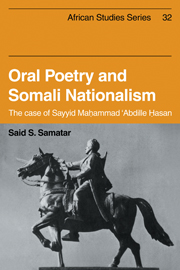Book contents
- Frontmatter
- Contents
- List of illustrations
- List of figures
- List of tables
- Note on transcription of Somali words
- Preface
- Introduction
- 1 Elements of Somali pastoral oratory: Prose
- 2 Elements of Somali pastoral oratory: Poetry
- 3 Occupation and resistance: The rise of the Somali Dervishes
- 4 Poetic oratory and the Dervish movement
- 5 Myth and the Mullah
- Notes
- Select bibliography
- Index
- Titles in the series
- Frontmatter
- Contents
- List of illustrations
- List of figures
- List of tables
- Note on transcription of Somali words
- Preface
- Introduction
- 1 Elements of Somali pastoral oratory: Prose
- 2 Elements of Somali pastoral oratory: Poetry
- 3 Occupation and resistance: The rise of the Somali Dervishes
- 4 Poetic oratory and the Dervish movement
- 5 Myth and the Mullah
- Notes
- Select bibliography
- Index
- Titles in the series
Summary
No character in recent Somali history has drawn so much attention from both foreign and indigenous writers as the Sayyid Maḥammad ʿAbdille Ḥasan, known in colonial literature as the ‘Mad Mullah’. Yet, paradoxically, few have been misinterpreted and misunderstood more than this enigmatic sheikh who caused untold trouble for the British administration in northern Somalia, restricted the Italians to the south and harried Ethiopia's forces in the west for two decades (1900–20). The Sayyid and his movement have been so condemned on the one hand and adulated on the other that it is hard for the student of Somali Dervishism to avoid either the unrestrained bias of anti-Dervish literature or the equally uncritical pro-Dervish publicity.
In the past, Western literature, British in particular, depicted Sayyid Maḥammad ʿAbdille Ḥasan as a ‘monomaniac a libertine, a profligate, and a cut-throat tyrant’, whose ‘oriental mind saw sensual pleasures as the natural rewards of earthly power’ and whose fanatical movement ‘spelt economic stagnation for Somaliland and ruin for its inhabitants’.
Recently, however, another interpretation of the Somali Dervishes has gained momentum. The latter, chiefly propounded by Somali national leaders and popularized by historians, portrays Maḥammad ʿAbdille Ḥasan as ‘a visionary, the father of the modern Somali nation’, blocked at every turn by imperialist machinations in his attempts to unify the Somali nation. With the struggle against colonialism and the concomitant achievement of independence, it was only natural that Somali leaders should look back in their history to find a national hero whose legacy commands a continuing vitality for contemporary Somalis and for the task of nation-building.
- Type
- Chapter
- Information
- Oral Poetry and Somali NationalismThe Case of Sayid Mahammad 'Abdille Hasan, pp. 182 - 202Publisher: Cambridge University PressPrint publication year: 1982



